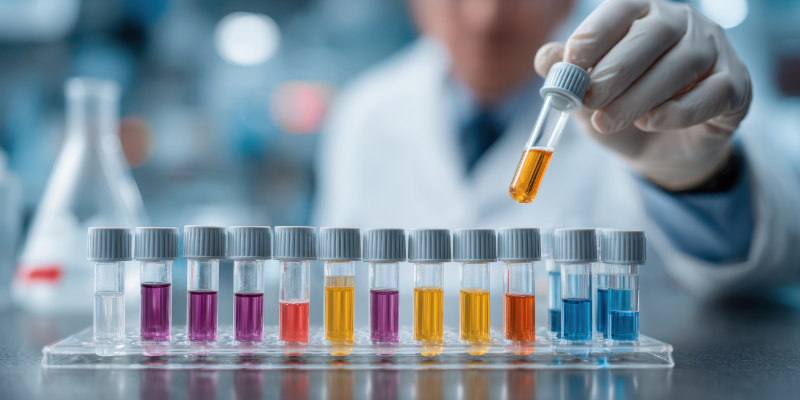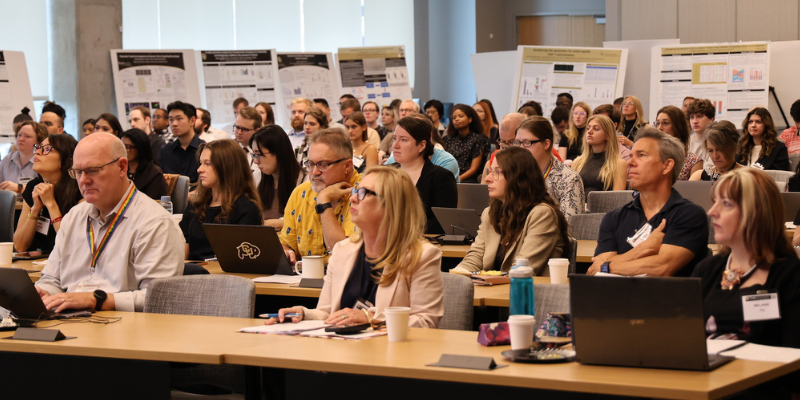Enzymes are ubiquitous in nature and present in every cell of our body, running life’s molecular machinery and acting as the first line of defense against cancer causing chemicals and other toxicants. Associate Professor Jed Lampe, PhD, and his team of researchers at the CU Anschutz Skaggs School of Pharmacy and Pharmaceutical Sciences are focused on gaining a better understanding of the role of these minuscule yet potent molecules and the chemical reactions that they catalyze. Their goal is to harness their knowledge of how enzymes function to enhance the safety and efficacy of medicines critical for human health and well-being.
The work of the Lampe Lab has recently been acknowledged by the National Institutes of Health (NIH) with two new R01 project grants totaling a combined $6.2 million.
Restoring Antibiotic Effectiveness
Antibiotic resistance has been steadily increasing for the past several decades, so much so that many of the antibiotics that were used in the past, including beta-lactams such as penicillin and amoxicillin, are no longer effective by themselves. Because of this, the fluoroquinolone antibiotics, such as levofloxacin (Levaquin) and ciprofloxacin (Cipro), are frequently the initial course of therapy prescribed by medical providers in treating or preventing illnesses. These drugs, estimated to save around 200,000 American lives annually and add 5-10 years of life expectancy at birth, may, however, be less effective in some patients. In particular, pediatric cystic fibrosis (CF) patients may suffer recurrent infections that often lead to the development of antibiotic resistant bacteria. The Lampe Lab is investigating one of these potential culprits: Pseudomonas aeruginosa (P. aeruginosa), a bacteria found in plants, mammals, and humans. While often harmless in healthy people, it can be opportunistic and highly dangerous in CF patients and burn victims. 
P. aeruginosa lurks in sticky mucus, causing serious infections in individuals with compromised immune systems or pre-existing diseases, such as CF or traumatic burns. Due to its natural antibiotic resistance, the pathogen is challenging to treat, as witnessed last year with the widespread contamination of eye drops, leading to 81 users treated for eye infections and four deaths.
While most enzymes serve valuable purposes, Dr. Sylvie Kandel in the Lampe Lab has identified a certain type of enzyme produced by P. aeruginosa, called a cytochrome P450 monooxygenase (or CYP, for short), that can metabolize the fluoroquinolone antibiotics that are often used to treat Pseudomonas infection in patients. This metabolism destroys the antibacterial function of the antibiotic, rendering it ineffective and thereby producing bacteria immune to its antibacterial effects.
Dr. Kandel is actively working to identify new drugs that will inhibit the Pseudomonas CYP enzyme, thereby preventing it from metabolizing the fluoroquinolone antibiotic and making the bacteria more susceptible to its effects. These types of inhibitory drugs, known as antibiotic “adjuvants” (or “helpers”), have already been developed for other bacterial enzymes that metabolize antibiotics, such as the beta-lactamase enzyme which metabolizes beta-lactam antibiotics. By inhibiting the beta-lactamase enzyme, these adjuvants help keep the concentration of the antibiotic high so that it can be effective.
The Lampe lab is borrowing from this successful strategy to develop adjuvants to inhibit the Pseudomonas CYP enzyme to prevent it from metabolizing the fluoroquinolone antibiotics in order to restore the efficacy of these important drugs.
The potential impact of this treatment could be far-reaching, benefiting hundreds of thousands of patients infected annually with this deadly bacterium, including those suffering from severe burns received during the wars in Ukraine and in the Middle East.
Tackling the Intricacy of Drug Metabolism During Pregnancy and Early Infancy
In contrast to the project focused on improving antibiotic efficacy, the second Lampe Lab project, also awarded an NIH grant, explores the role of enzymes in drug toxicity. The two projects are linked in that they both are trying to understand how CYP enzymes metabolize drugs. Although, in this case, the focus is on antiviral drugs that are metabolized by human, not bacterial, CYP enzymes. Under normal circumstances, CYP enzymes in the human liver protect us by detoxifying our blood from unwanted chemicals and drugs.
However, some CYPs also have a “night job” whereby they synthesize and eliminate steroid hormones that are important for our normal physiological function. It is important for your body to keep a tight control over the concentrations of these powerful hormones, particularly during pregnancy and the first few weeks of life. Inhibition of either synthesis or elimination can result in serious adverse effects, including low birthweight, adrenal insufficiency, and premature birth (one of the leading causes of infant mortality in the U.S.).
While CYP enzymes synthesize and metabolize steroid hormones critical for fetal and newborn growth and development, certain antiviral drugs can interfere with this process, leading to toxic steroid buildup and related complications. The team, including Dr. Kandel and PhD student Emily Gracey, is studying specific CYP enzymes that contribute to these negative antiviral drug-hormone interactions in HIV-positive patients. They aim to make current antiviral drugs safer for pregnant women and their newborns, as well as design new drugs that do not inhibit these crucial enzymes in pregnant women and their infants infected with HIV.
Moving from Bench to Bedside
While these projects may seem esoteric from an external perspective, Lampe emphasizes their strong translational potential. The foundational scientific work conducted in the lab aims to translate into applied science in medical practice, ensuring practical implications for improving patient lives.
The Lampe Lab team is confident in their ability to continue to directly impact patient well-being. Their work serves as an example of the robust translational research going on in labs throughout the Department of Pharmaceutical Sciences.




